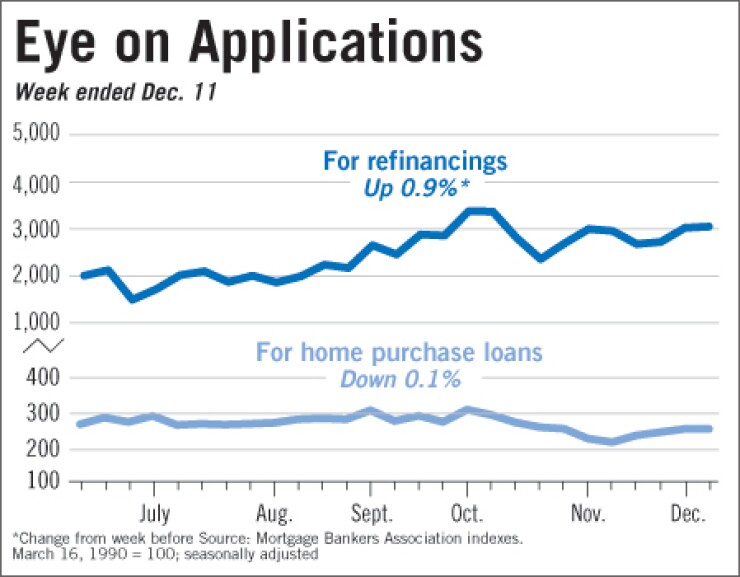
SAFE Expense
National licensing standards for sales employees at nonbank mortgage companies could be even more expensive than the industry thought.
The Department of Housing and Urban Development said Tuesday that it is "inclined" to subject loan servicing workers who talk to borrowers about modifications to the same minimum requirements as retail loan officers. HUD is responsible for setting those requirements under the Secure and Fair Enforcement Mortgage Licensing Act, which was enacted last year and is intended to prevent fraud and unscrupulous sales tactics by originators.
States handle the licensing and are allowed to set tougher standards than the minimums that HUD spelled out in a
Until a few years ago, mortgage servicing was mostly sleepy back-office work like mailing statements, collecting payments and keeping records. But HUD said in the proposed rule that much of the work servicers are doing these days — like taking applications for loan mods and negotiating their terms — is "virtually indistinguishable" from what loan officers do with refinancings.
Hence, it would make sense to extend the licensing standards to the people performing those sales-like functions, HUD said.
Borrowers who seek modifications from their servicers "may face the same risks that Congress sought to control through loan originator licensing," the department said.
Deborah Robertson, an attorney with McGlinchey Stafford PPLC in Albany, N.Y., said getting workers licensed would cost a servicer about $600 per employee in each state, or up to $30,000 per worker if the company services loans nationwide.
SAFE-Sorry
The SAFE Act's state licensing requirements apply only to nonbanks. This was already a sore point for those lenders well before HUD's proposed rule came out.
Michael L. Larssen, the chief executive of Larssen Consulting Group in Clearwater, Fla., agreed that there's little distinction between origination and the work servicers do in loan mods. But he said the law's licensing exemption for banks would give them an unfair advantage in any business where it is applied.
Even a smaller nonbank lender may do business in as many as 15 states, Larssen said, so the costs of getting a call center worker licensed in each one can add up. Licensing employees would also require numerous hours of training, he said.
"Besides the cost and time for the training, there is lost revenue from the time these individuals are away from their jobs producing loans," he said by e-mail.
Banks also now have a recruiting advantage, Larssen said. "If you had two companies that were even" with their job offers, "but one require[d] you to do all SAFE training and the other did not, who would you most likely select?"
The law does require banks and nonbanks alike to register their loan officers in a database that the Conference of State Bank Supervisors and the American Association of Residential Mortgage Regulators are developing. But in a Nov. 12
"We're hopeful that … we can convince HUD to follow a parallel track," Robertson said.
Under HUD's proposed rule, nonbank loan originators must get their state licenses by July 31 of next year. The department said it would let the states extend this deadline for workers involved in mods or refis under the Obama administration's Making Home Affordable programs for distressed borrowers.
Still, Robertson said some state laws require loan originators at nonbanks to be licensed by Dec. 31 of this year, so many servicers could find themselves in noncompliance with those laws under HUD's proposed rule.
She also said some state laws governing licensing of mortgage originators exclude loan servicers. These laws presumably would not meet HUD's minimum requirements, she said.
Despite its "inclination," HUD invited public comments on whether licensing requirements should extend to servicing employees. Comments are due Feb. 16.
Safe to Go
JPMorgan Chase & Co. said Wednesday that it plans to open another 24 loan modification offices around the country by March 31.
The offices, which JPMorgan Chase created nearly a year ago, are open six days a week. Borrowers can schedule appointments or just walk in to get advice and help with paperwork for a mod.
Six of the new offices will be in new markets: Cleveland, Dallas, Houston, Boca Raton, Fort Lauderdale and Seattle. The other 18 new offices will supplement existing ones in Florida and California. All told, the expansion will bring the company's
According to the Treasury Department, by Nov. 30 JPMorgan Chase had begun trial mods for 31% of its loans that were eligible for the Home Affordable Modification Program. That was the sixth-highest percentage among the program's
It probably bears repeating that since JPMorgan Chase is a bank, its loan mod workers are not subject to SAFE Act licensing requirements.





